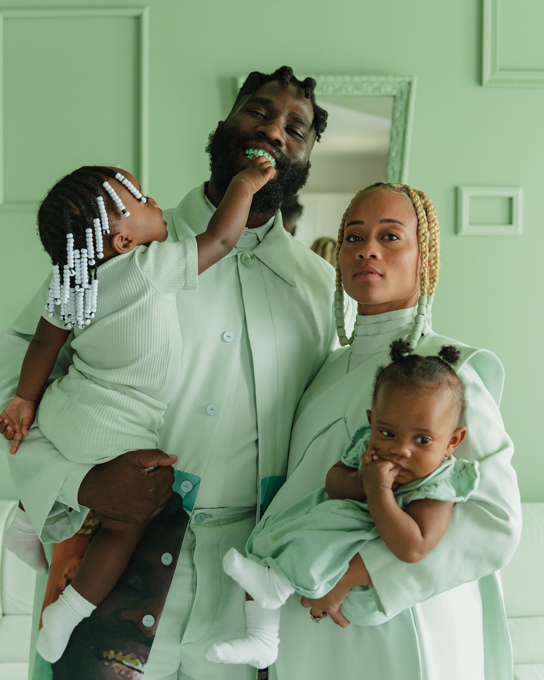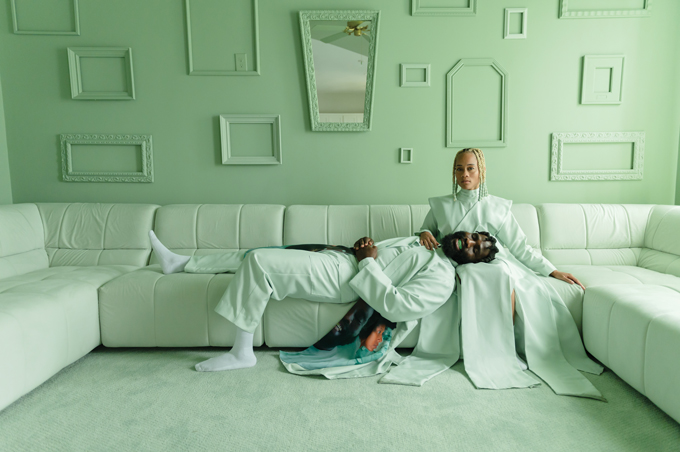Music
TOBE

Ib Txoj Kev Hlub: Kev Sib Tham nrog Tobe Nwigwe
cov lus los ntawm Zachary Weg
Tobe Nwigwe yog ntau yam: rapper, tus neeg hu nkauj, ib tug fashionista, yav dhau los NFL kev cia siab. Tab sis, saum toj no tag nrho, nws yog ib tug txiv neej muaj txuj ci zoo thiab mob siab rau. Tsa hauv Houston thiab rooted hauv Nigeria (nws niam nws txiv yog cov neeg tsiv teb tsaws chaw los ntawm West African lub teb chaws), Nwigwe tau ua kev sib raug zoo, radiant hip-hop rau xyoo dhau los. Nrog xob nroos ntws nco txog Andre 3000 thiab kev txawj ntse wordplay uas cim ntau yam zoo emcees, Nwigwe tau nce zuj zus nyob rau hauv ib nrab xyoo caum dhau los, thiab nws lub sijhawm tau los txog thaum kawg.
Tsuas yog peb lub hlis dhau los, 33-xyoo-laus tso tawm zaj nkauj, 'Kuv Xav Tau Koj Rau' hais txog kev tua neeg phem ntawm ib tus tub ntxhais hluas Dub ua haujlwm kho mob, Breonna Taylor, thiab tsim nyog teeb tsa hauv internet hluav taws. A short yet urgent track that pleads for the arrest of the Louisville police officers responsible for Taylor’s death, the SoundCloud sensation in many ways exemplifies what appears to be Nwigwe’s ethos as a whole: waking people up in a fierce yet loving manner. For Nwigwe, whose first name Tobechukwu is the Igbo word for Praise God, making music and creating art is, s, a wholesome family affair. Although he’s been contacted by such lauded labels as Mass Appeal and Roc Nation, the artist has remained independent and does his work with his loved ones, which include his wife, Fat, his best friend and producer, LaNell “NELL” Grant, and even his 1-year-old daughter, Ivory. Along with these individuals, Nwigwe has made affecting art that has gained attention from such luminaries as former First Lady, Michelle Obama, actor, Michael B. Jordan, and R&B legend, Erykah Badu. All of this praise makes sense; Nwigwe delivers both rhymes and messages that shine.
Music wasn’t always on his mind, though. A linebacker while enrolled at the University of North Texas, the rapper at first wanted to make it to the pros but an injury sidelined him and, eventually, he started seriously considering hip-hop as a career. As he says by phone from Houston, “It definitely was by choice. I just always tried to make sure I was a hundred percent myself, so I didn’t have to be a character ever. I didn’t have to act for people. I didn’t have to be a prisoner to the movement or my purpose.” Watching his NPR Tiny Desk concert from last year, in which he raps and jokes with his band, including stunning singers, David Michael Wyatt and Madeline Edwards, one does sense that Nwigwe is fearlessly, but humbly, being himself. The fact that he is a compelling lyricist—”We come from where most don’t break free, We had to learn why caged birds sing,” goes his cosmic track, «Caged Birds»—and a charismatic performer only underscores his positivity.

It’s a charm that speaks to who Nwigwe is at his core: a lover. His wife, Fat, must have known this about him when they met at a ‘church house’ many years ago. When asked how his music changed after he first encountered her, he says, “It put a lot of things into perspective, just really put a highlight over what’s important in life and what’s not.
As the world faces the great fight of social injustice against people of color, in which precious lives have been cut short and systemic racism persists, Nwigwe has recently put out a release titled The Pandemic Project that represents this mighty struggle yet also emphasizes his life-affirming worldview. The Breonna Taylor call to action, “I Need You To” opens the compilation, setting the stage for Nwigwe’s acutely aware hip-hop, but it also makes way for such heavenly songs as “Make it Home,” in which the singer yearns to see “streets paved with gold” and a life beyond despair. “Although it’s been a tough year,” Nwigwe says of the project, “We remained true to who we are and kept making purposeful music for our people that captures who we authentically are: family.” It’s not a stretch to imagine that Nwigwe considers his audience family, too. He seems to be after one peaceful consciousness, one love, that can bring people together. He wants to “make purpose popular,” as he says, and not just open people’s eyes but move them towards action. With his bright smile and bottomless compassion, he’s poised to do just that.
Pieces of You Issue 12
